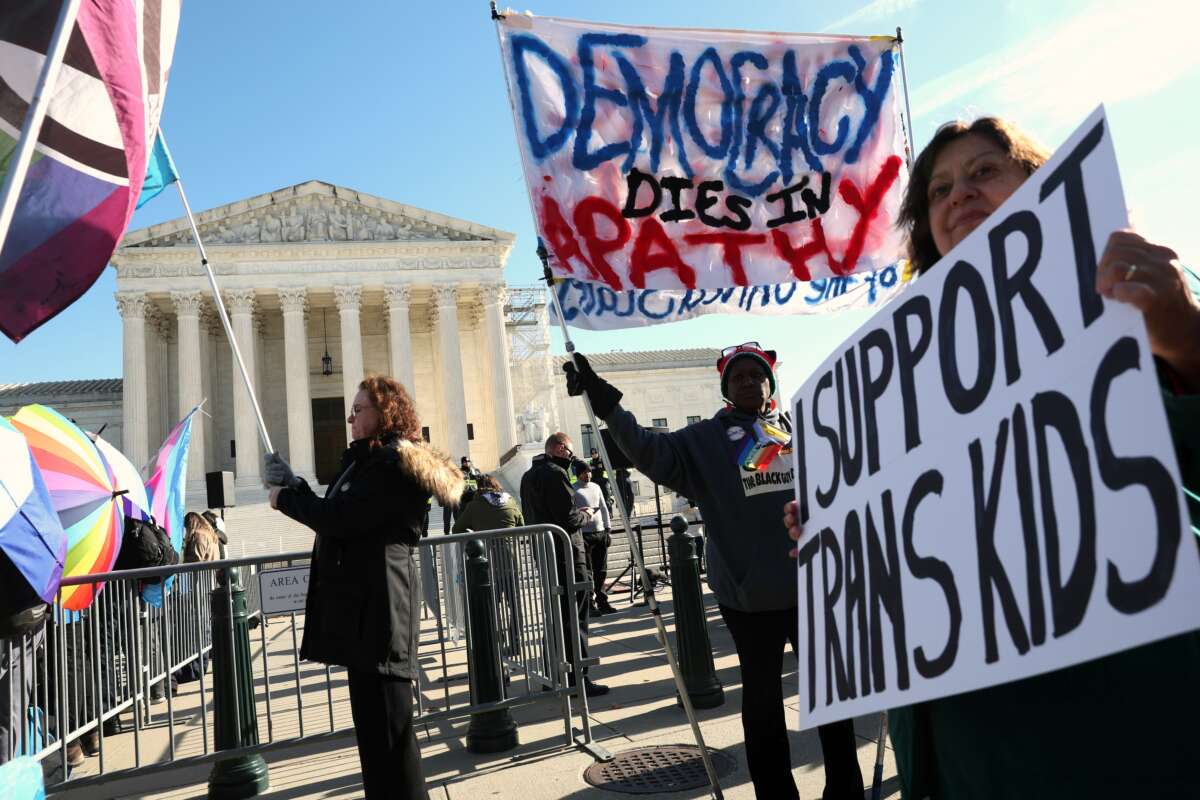After a record-breaking year for anti-trans legislation, 2025 is shaping up to be even more challenging for transgender and queer people across the United States. A legislative tracker maintained by Erin In The Morning and other volunteers has found that nearly 120 anti-trans and anti-LGBTQ+ bills have already been filed in states nationwide ahead of the 2025 legislative season. This far surpasses the 80 bills filed by this time in 2023, signaling another historic wave of legal attacks on the ability of transgender people to move, live, and exist freely as themselves in public.
The bulk of the bills so far come from Texas and Missouri, two of the earlier states that release prefilled legislation ahead of the 2025 session. However, states like South Carolina, New Hampshire, Georgia, Wyoming, and Montana all feature multiple anti-LGBTQ+ bills, with more being added every day. Thirteen states in all have seen anti-trans bills filed: Alabama, Arizona, Georgia, Indiana, Missouri, Montana, Nevada, New Hampshire, Ohio, South Carolina, Texas, Washington, and Wyoming.
This year, several state bills aim to strip legal recognition from transgender people entirely. Between 2022 and 2024, ten states passed such legislation or enacted similar policies, with devastating consequences for affected communities. In Kansas, Florida, and Texas, transgender individuals are now unable to update their driver’s licenses, and in some cases, states have begun reverting gender marker changes that were made years or even decades ago. Transgender people who have lived as their legal gender for years may face forced reversion of their identification documents if these new bills are enacted. Similar legislation has already been introduced in Texas, Missouri, South Carolina, and Wyoming.
In many states that have passed such legislation, bathroom bans have also been attached. Indeed, in the initial rush of bills, several bathroom bans can be found that target transgender adults. Two Texas bills would allow lawsuits if transgender people are encountered in bathrooms. One bill in Montana would bar transgender people from publicly owned bathrooms of their gender identity. One bill in Missouri would even make it “unlawful public discrimination” to allow a transgender person in bathrooms of their gender identity.
Book bans are seeing a resurgence in the prefiled bills. In 2024, PEN America found 10,046 instances of individual books banned, affecting 4,231 unique titles. Banned books include The Handmaid’s Tale, Flamer, The Perks of Being a Wallflower, Gender Queer, and more. Texas features several such bills this year, despite the state being rebuked by higher courts for book bans in 2024.
Another common type of anti-trans legislation that is common is sports bans. Many bills aim to expand existing restrictions to even broader contexts. In Texas, one proposed bill seeks to deny private sporting events access to the state’s Events Trust Fund — a source of professional funding for major sporting events — if they allow trans athletes to compete. Other bills aim to extend sports bans to new age groups. For instance, a bill in Wyoming would expand its current ban, which applies to students in grade 7 and above, to include kindergarteners.
Several other categories of bills have seen activity, such as drag bans, forced outing of transgender students, “don’t say gay” bills, birth certificate gender change bans, drivers license gender change bans, and more.
According to the ACLU, legislative attacks on transgender people grew “exponentially” over 2023 and 2024. These anti-trans laws have directly caused an increase in suicide attempts in some states by up to 72%. According to the Centers for Disease Control, one in four transgender youth have attempted to take their own life in the last year, with many of those attempts requiring medical treatment.
In the coming months, a landmark Supreme Court decision will determine the constitutional fate of bills targeting transgender people. While the case centers on a law restricting transgender medical care, its broader implications go far deeper — addressing whether discrimination against transgender people qualifies as sex discrimination warranting heightened scrutiny. The Court may also weigh whether transgender individuals are granted equal protection around their transgender status. This ruling has the potential to either shut the door on many of these bills and laws or swing it wide open, unleashing a flood of legislative attacks that could make 2025 a historically devastating year for transgender rights.
These bills will continue to be tracked by Erin In The Morning and other volunteers and can be found here.
This piece was republished with permission from Erin In The Morning.
Angry, shocked, overwhelmed? Take action: Support independent media.
We’ve borne witness to a chaotic first few months in Trump’s presidency.
Over the last months, each executive order has delivered shock and bewilderment — a core part of a strategy to make the right-wing turn feel inevitable and overwhelming. But, as organizer Sandra Avalos implored us to remember in Truthout last November, “Together, we are more powerful than Trump.”
Indeed, the Trump administration is pushing through executive orders, but — as we’ve reported at Truthout — many are in legal limbo and face court challenges from unions and civil rights groups. Efforts to quash anti-racist teaching and DEI programs are stalled by education faculty, staff, and students refusing to comply. And communities across the country are coming together to raise the alarm on ICE raids, inform neighbors of their civil rights, and protect each other in moving shows of solidarity.
It will be a long fight ahead. And as nonprofit movement media, Truthout plans to be there documenting and uplifting resistance.
As we undertake this life-sustaining work, we appeal for your support. Please, if you find value in what we do, join our community of sustainers by making a monthly or one-time gift.
